Are you considering starting organic chicken farming as a small business or for personal needs? And want to know the basic to expert level of organic chicken farming.
If so this article is about starting organic chicken farming to do business or fulfilling your personal needs, and learning all about it.
Organic chicken farming is about raising chickens without chemicals or genetic modifications. Chickens get space to roam and live naturally.
Let’s dive into the deep comprehensive guide.
What is Organic Chicken?
Organic chicken is chicken that is raised according to organic farming standards. Which means raising chickens without the use of synthetic pesticides, fertilizers, antibiotics, or genetically modified organisms (GMOs).
In other words, this means food production (eggs and meat from chickens) in which no artificial stuff like food, or antibiotics are involved.
That’s why organic chicken is seen as healthier and better than regular or commercial chicken. Because they are free from artificial stuff and support more natural farming.
A USDA organic certification is important for chickens to be organic, to get USDA organic certification. Chickens must follow strict rules and guidelines, which are in the article below.
| Tip:
You can raise organic chickens by simply giving access to outdoor areas and providing ready-made organic feed. |
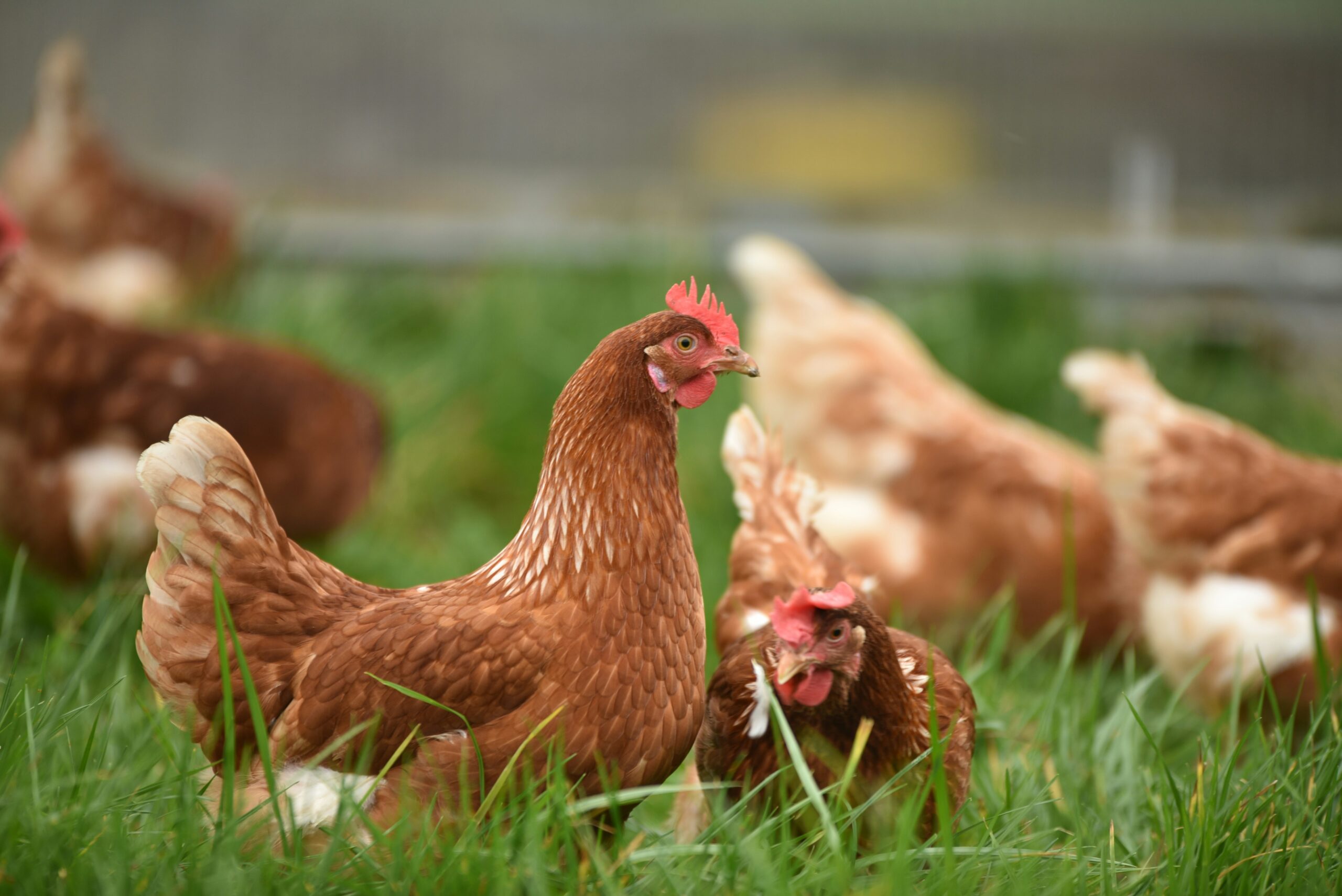
What is Organic Chicken Farming?
In organic chicken farming, the chickens are normally given access to outdoor areas to engage in natural behaviors and do pecking, scratching, and foraging for food.
The diet prepared for them also should be organic and non-GMO. They are made from natural and organic ingredients without synthetic additives and chemicals.
Overall organic chicken farming is a method or business that provides natural and sustainable practices, outdoor access, chicken welfare, health care by natural remedies, and preventive measures while adhering to strict organic standards for chickens.
Additionally, the chicken farm must be certified by a recognized organic certifying agency. Which ensures that they follow the rules and regulations set by government or independent organizations.

Advantages of Organic Chicken Farming
Organic chicken farming provides several advantages and value to both consumers and the environment:
- Healthier and Safe Meat
These organic chickens are raise without antibiotics, or synthetic pesticides, which means the meat and eggs are free from potentially harmful residues.
- Nutritional Benefits and Value
Chicken has higher levels of important nutrients such as omega-3 fatty acids and antioxidants, which are beneficial for human health.
- Chickens Welfare
Require access to outdoor areas and are raise in conditions that prioritize their welfare, including access to natural light and space to move around freely.
- Environmental Sustainability
This farming helps the environment by taking care of the soil, changing crops, and using natural ways to deal with pests. This means less pollution in water and soil getting worse.
- Reduced Antibiotic Resistance
Organic farming stops the regular use of antibiotics in raising poultry, which helps prevent the rise of bacteria that are resistant to antibiotics which is important for public health.
- Support for Small Farmers
These types of chicken farms are usually smaller, giving local farmers a chance to make money and developing and improving the rural economies.
Disadvantages of Organic Chicken Farming
Organic chicken farming, although praised for its advantages, also has its disadvantages and drawbacks:
- Higher Costs
Organic chicken farming requires more expensive organic feed and may involve higher labor costs due to stricter rules for the care of the chickens.
- Lower Yields
This farming method often leads to lower yields than conventional methods, resulting in fewer chickens being produced.
- Greater Vulnerability to Disease
As organic chickens are raised without the use of synthetic pesticides or antibiotics, organic chicken farms may be more susceptible to disease, which can lead to higher mortality rates.
- Limited Availability
Organic chicken products are limited in availability compared to conventionally raised chickens, which can limit market access and potential profits for farmers.
- Strict Regulations and Certification
Farming needs strict rules and certification, which take a lot of time and money for farmers to keep up with.
- Challenges in Pest Control
This farming doesn’t allow synthetic pesticides, making it harder to control pests and possibly causing crop losses or damage.
Is Organic Chicken Farming Profitable?
Yes, organic chicken farming can be profitable, and give you a lot of profit when done in the right and good way.
However, it depends on various factors such as location, market demand, production costs, and management practices.
Organic chicken products usually cost more than normal products because they are healthier and better for the humans and environment.
However, organic chicken farming usually needs more money at the start and ongoing costs compared to regular methods like the costs of organic food, fees for getting certified, and higher labor costs for managing organic standards.
Being profitable in organic chicken farming needs good management, smart ways to sell, and a steady way to get the chickens to buyers so you can make money all the time.
Also, keeping up with what people want to buy and what’s popular in the market can make sure you earn as much as possible in the organic chicken farming business.
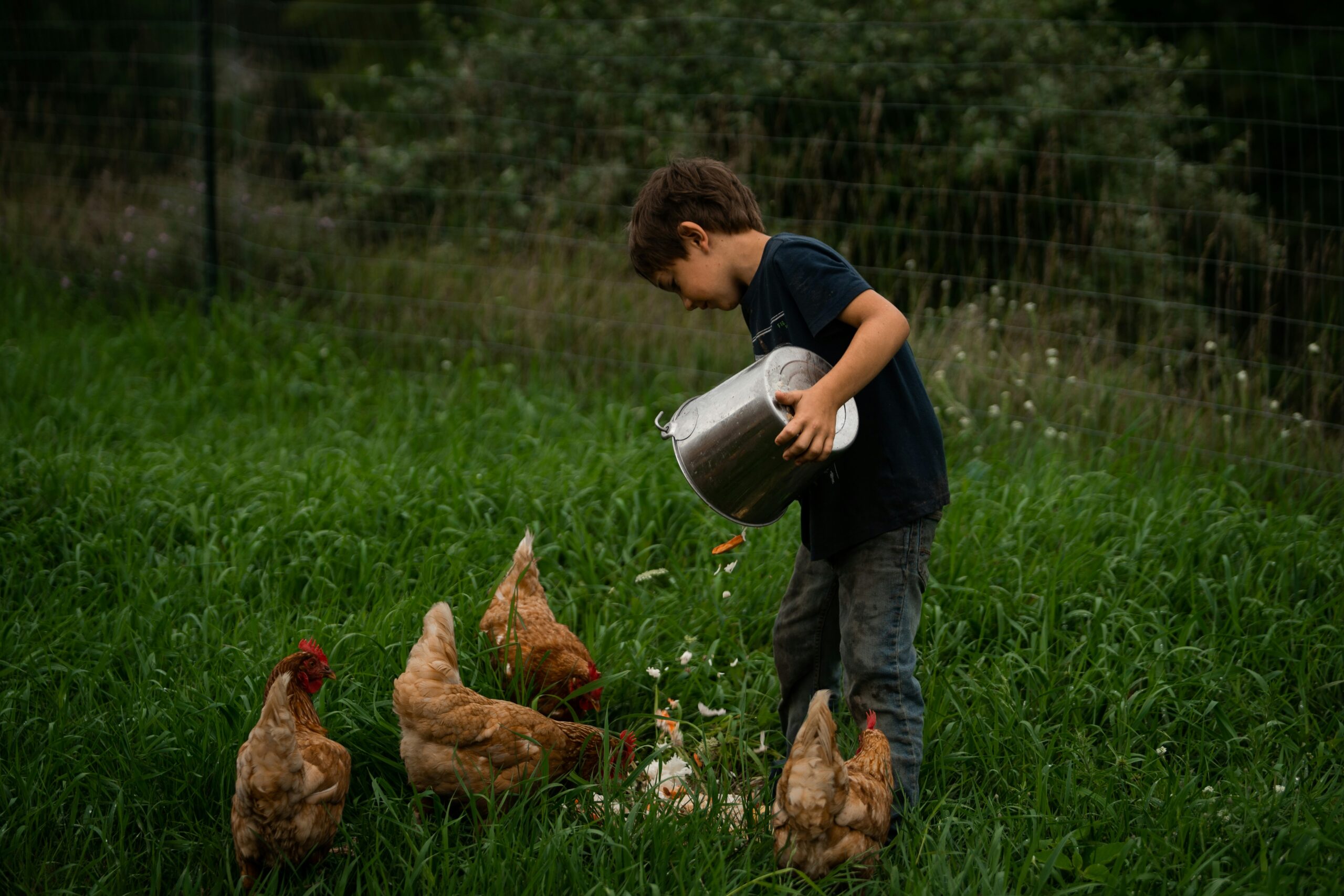
What is Free-Range Chicken Farming?
Organic chicken farming and free-range chicken farming are related but different. Both ways care about how animals are treated, but they have their features.
Free-range chicken farming involves giving chickens access to outdoor areas for roaming, foraging, and engaging in natural behaviors.
Free-range chickens might not always be raised with organic farming methods. They could have access to non-organic food and medicines depending on how the farm operates.
In short, both methods of organic and free-range chicken farming aim to give chickens better living conditions than conventional farming, but the main difference lies in their specific practices and standards.
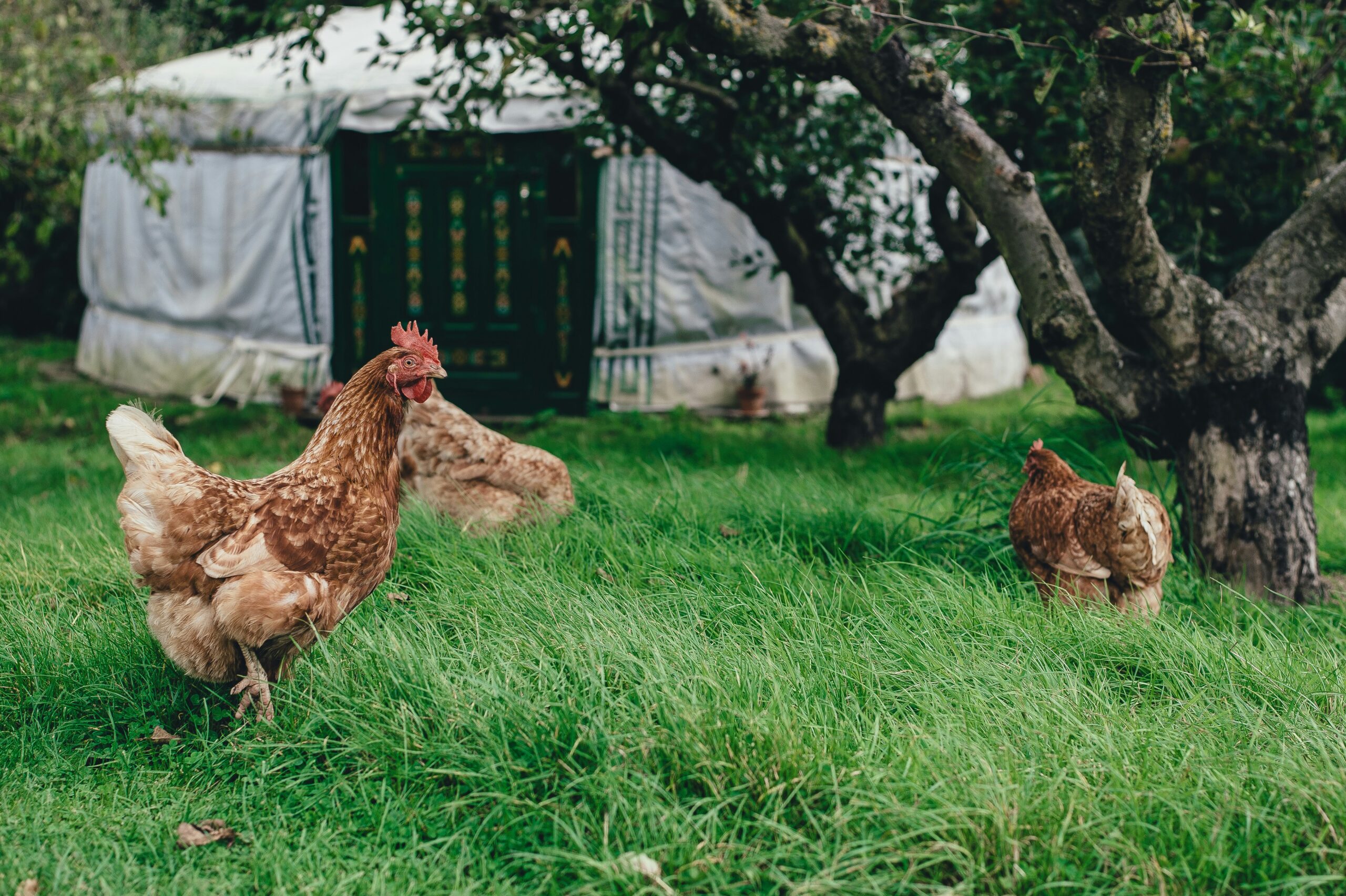
Requirements for Chickens to be Organic
So, for chickens to be called organic chickens, they have to meet specific rules and regulations set by the government or independent organizations.
Let’s go through what these rules usually are:
-
Organic Feed for Organic Chicken Farming
Chickens must be fed certified organic or natural feed. This means the feed is grown without synthetic pesticides, fertilizers, or genetically modified organisms (GMOs).
The feed should consist primarily of grains, such as corn and soybeans. They are organically produced, or you can feed them ready-made organic chicken feed.
-
Access to Outdoor Areas
Organic chickens must have access to the outdoors, where they can engage in pecking, scratching, and foraging.
This outdoor space should be managed according to organic standards, with soil free from prohibited substances and access to fresh air and sunlight.
-
No Antibiotics in Organic Chicken Farming
Antibiotics and growth hormones are prohibited in organic chicken production. Instead, organic farmers use natural methods to promote chicken health.
Such as providing natural remedies for treatment, a clean environment, balanced nutrition, and access to outdoor pastures.
-
Animal Welfare Standards
Organic certification often includes specific requirements for animal welfare which means they have to be treat well. They need enough room to move, clean water to drink, and shelter from bad weather.
-
Natural Living Conditions
Chickens raised organically should be provided with living conditions that mimic their natural habitat as much as possible.
This includes access to pasture for grazing, perches for roosting, and nesting boxes for egg-laying.
-
No Synthetic Chemicals
Organic chickens can’t be treat with synthetic chemicals like pesticides, herbicides, or fertilizers. And the land they live on can’t have these chemicals either.
-
Certification to be Organic
Finally, to be sold as organic, chickens must be raised on farms that are certified organic by a recognize certifying agency.
These agencies inspect farms regularly to ensure they comply with organic standards and maintain proper documentation of their practices.
Recommended Feed for Your Organic Chickens

For chicken to be organic it’s crucial to feed just organic feed means feed that is made from natural ingredients without artificial stuff.
Here is the nutritious organic chicken feed recipe or feed for your organic chickens:
- The organic chicken feed must contain 60% organic whole grains such as wheat, barley, oats, corn, brown rice, and rye.
- Protein which is an essential nutrient should be 20% in their feed, the sources of proteins are soybean meal, fish meal, or pea protein.
- The important nutrient calcium should be 10% in their feed such as crushed oyster shells or limestone, dairy products, etc.
- 5% organic sunflower seeds, 3% organic flaxseed, and 2% minerals and vitamins to ensure a balanced nutritious diet.
- Also, you can add other things such as peanuts, wheat bran, split peas, lentils, quinoa, sesame seeds, and kelp to their diet but make sure that they are fully organic or made from natural ingredients.
The best is to add all these organic ingredients like protein, calcium, minerals, vitamins, etc in a large mixing bowl and mix well until all ingredients are evenly distributed.
Also, add the organic poultry grit to the mixture which aids in digestion by helping chickens grind their food in their gizzards.
Store the prepared organic chicken feed in a cool, dry place in an airtight container to maintain freshness and cleanliness.
Based on their age, size, and nutritional needs, provide the prepared feed to your organic chickens, and ensure access to clean, fresh water at all times.
Disease Control in Organic Chicken Farming
Disease-controlling and disease-treating are some of the most important parts, especially in organic chicken farming.
In organic chicken farming diseases are control and treated by natural remedies or organic farming standards.
Epsom salts are a good treatment for diarrhea, Chopped garlic in small amounts daily will help prevent parasites and boost the immune system, Aloe vera is best for general health, etc.
Farmers or individuals who own chickens should check them every day for signs of sickness. If one seems sick, keep it away from the others, to stop the sickness or disease from spreading.
Also, it’s important to know a veterinarian nearby who can help if your chickens get sick.

Here are simple practices for controlling diseases in your organic chicken farming:
- Keep Bad/Dirty Stuff Out
Make sure no germs or dirtiness get into the chicken farm, clean all and everything, and only let trusted people in.
- Keep the Farm Clean
Make sure the chickens live in a clean and dry place, clean up their poop often, and keep their homes and stuff clean too.
- Provide Good Diet
Give them good and nutritious food that helps their bodies stay strong, also, make sure they have enough space to move around and breathe fresh air.
- Use Natural Stuff
Use natural things like herbs and healthy bacteria to keep the chickens healthy and happy all the time.
- Keep an Eye on Chickens
Watch your chickens closely for any signs of sickness or disease. If you see something wrong or abnormal, take action fast.
- Choose the Right Chickens
Pick chickens that are strong, adaptable, hardy, and don’t get sick easily, to prevent diseases and mortality.
Best Chicken Breeds for Organic Chicken Farming
Organic chicken farming is not that hard but you have to ensure their access to outdoor places and organic or natural food and some other organic farming standards need to be followed.
But choosing chicken breeds for organic chicken farming is also a challenge, to choose the best chicken breed you need careful attention to their adaptability, egg-laying ability, hardiness, etc.
Best chicken breeds for organic chicken farming:
these are some best breeds for organic chicken farming:
- Rhode Island Red
Rhode Island Reds are a popular choice for organic farming and they are well known for their hardiness and excellent egg production. They are also good foragers, making them well-suited for organic chicken and free-range farming.
- Australorp
Australorps are a chicken breed valued for their high egg production and calm demeanor. They thrive in free-range farming and organic farming environments and are relatively low-maintenance.
- Barred Plymouth Rock
These chickens are known for their dual-purpose nature. They are good for both egg production and meat. They have a friendly disposition and do well in an organic farming environment.
- Sussex
Sussex chickens are docile and have excellent foraging abilities. They are good layers of large brown eggs and are well-suite to organic farming practices.
Orpington chickens are large, gentle birds that do well in free-range farming. They are famous for their good egg production and meat.
- Wyandotte
Wyandottes are a dual-purpose breed known for their attractive appearance and good egg-laying. They are hardy and adaptable chickens that do well in a variety of climates.
- New Hampshire Red
These chickens are similar to Rhode Island Reds, they are hardy birds with good egg-laying abilities. They are well-suite to free-range environments and organic farming practices.
- Leghorn
Leghorns are excellent egg layers and are famous for their efficiency in converting feed into eggs. While they are more active than some other breeds, they can still adapt well to free-range and organic farming.
When selecting chicken breeds for organic farming, it’s essential to understand your climate, available resources, and market demand for both eggs and meat.
Additionally, prioritize breeds known for their ability to thrive without antibiotics or other artificial interventions, as this aligns with organic farming principles.
How to Become an Organic Chicken Farmer?
To become an organic chicken farmer you need to conduct thorough research and understand a lot of things about organic farming and about selling, if you want to sell their eggs or them also.
After understanding the concept of organic chicken farming and ensuring that you know and understand almost all the things about organic farming.
- Then the real work begins, choosing the right location that is spacious, well-drained, and away from sources of contamination. Ideally, your farmland should also have access to clean water and ample natural vegetation for grazing.
- Also ensure that your farm provides adequate shelter, ventilation, and protection from predators for chickens to keep them healthy and secure.
- Selecting the right chicken breeds is essential for organic chicken farming, like breeds that are well-suited to your climate and production goals. Heritage breeds are often favor for their hardiness and ability to thrive in outdoor environments.
- Providing an organic or natural ingredients diet is essential for organic chickens. Provide access to organic feed that is free from GMOs, pesticides, and synthetic additives.
- Preventing disease and promoting the health of your chickens by natural or organic remedies is paramount in organic farming. Implement strict biosecurity measures like limiting visitors to your farm and practicing proper sanitation to minimize the risk of disease transmission.
- Try to sell your organic products to your target and potential audience. Including farmers’ markets, community-supported agriculture (CSA) programs, and online platforms. Consider partnering with local restaurants, grocery stores, or specialty shops to sell your products.
This is a brief guide to starting your journey as an organic chicken farmer. If you’re interested in learning more, don’t hesitate to ask in the comments or reach out via email.
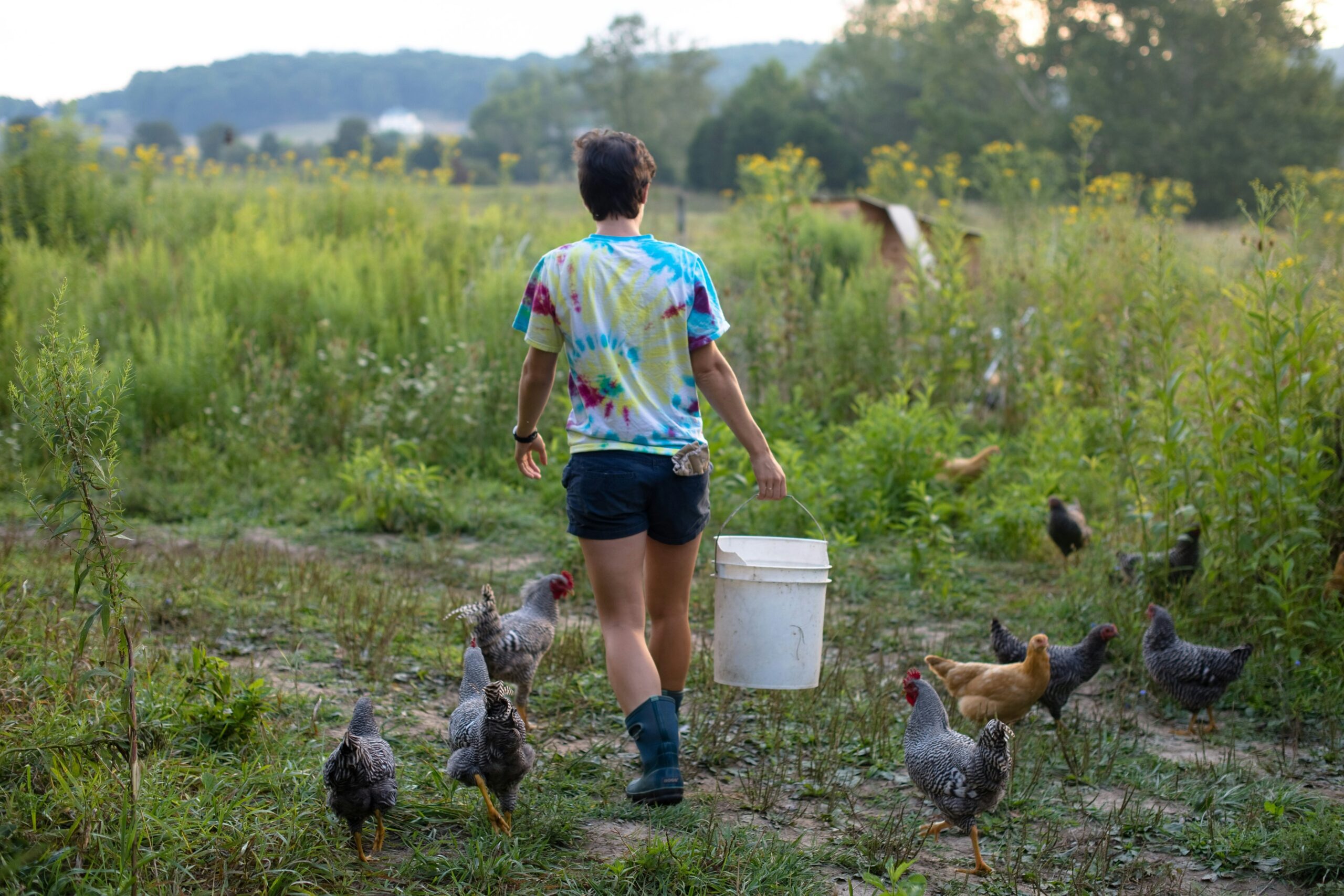
Winding Up
To sum up, organic chicken farming can be a joyful and rewarding method of producing organic products for consumers.
To begin your journey as an organic chicken farmer you need to select the best location, and best chicken breed, and follow the organic chicken farming standard.
If you have any questions or concerns about organic chicken farming or related topics, please don’t hesitate to ask. We’re here to help address any inquiries you may have.
FAQs
How are Organic Chickens Raised?
Organic chicken is raised according to organic farming standards. Which means raising chickens without the use of synthetic pesticides, fertilizers, antibiotics, or genetically modified organisms (GMOs).
Is heritage farm chicken organic?
Heritage farm chickens may or may not be organic, some heritage farms choose organic practices, but not all do. To ensure you’re getting organic chicken, check for organic certification on the product label.
Are organic chickens better than commercial chickens?
Organic chickens are raise with organic feed and prioritize animal welfare and environmental sustainability. They may have a perceive taste and nutritional advantage.
Commercial chickens, while cheaper and more widely available, are typically raised in intensive farming operations. The choice depends on personal values and priorities regarding animal welfare, environmental impact, and taste preferences.
How long do organic chickens take to grow?
Organic chickens typically take around 12 to 16 weeks to reach maturity, depending on factors such as breed, diet, and environmental conditions.
Compare to conventionally raise chickens, organic chickens may take a bit longer time to grow. Because they do not eat growth hormones or antibiotics, and their diet is typically more natural.
Hello! I’m Ibrahim, the owner and writer of this blog. I run a chicken farm with 160 chickens, and I’ve gained a lot of knowledge about raising and caring for them. Now, I want to share my insights and experiences with you to help you in chicken keeping.

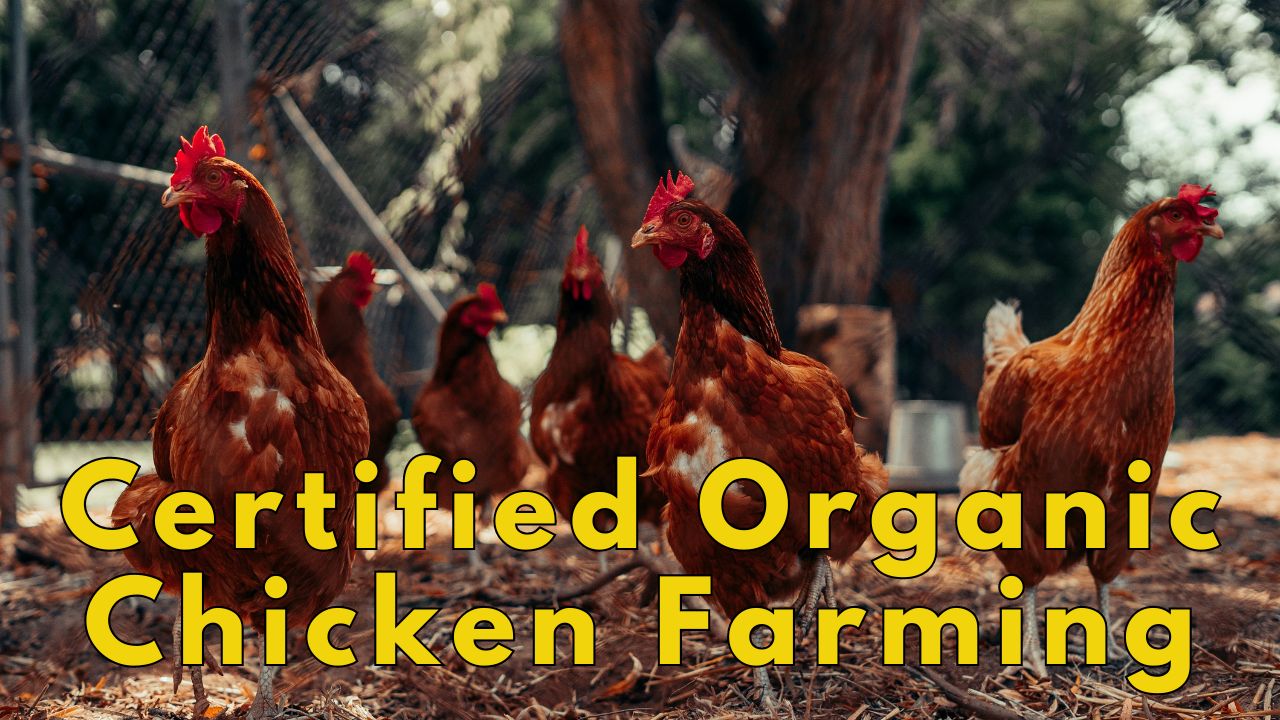
2 thoughts on “Organic Chicken Farming: Guide to Certification and Success”